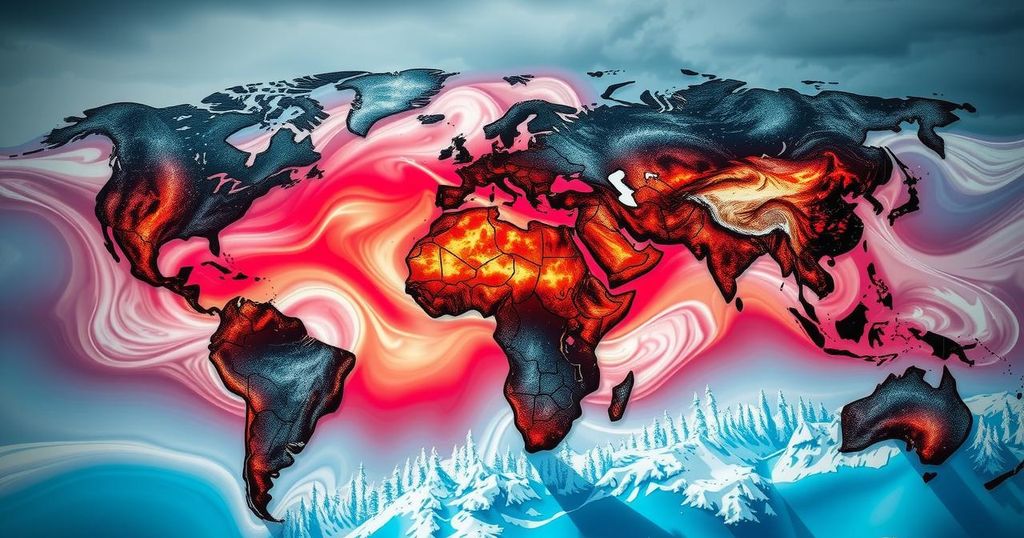In 2024, climate change severely impacted global ecosystems and communities with record heat and extreme weather events. The year is projected to be the hottest on record, exacerbated by high greenhouse gas levels. UN leaders urge immediate measures to reduce emissions and transition to renewable energy. The WMO emphasizes the urgent need for climate action, citing increasing fatalities and displacement caused by climate extremes. As it marks its 75th anniversary, WMO remains committed to global climate coordination.
Climate change’s repercussions have intensified globally in 2024, manifesting in severe consequences for ecosystems, communities, and economies. The World Meteorological Organization (WMO) has declared 2024 the hottest year on record, demonstrating a decade marked by record temperatures driven by human-induced factors. Greenhouse gas concentrations continue to escalate to unparalleled levels, contributing to sustained warming well into the future.
UN Secretary-General António Guterres emphasized the urgent need for international action, stating, “Today I can officially report that we have just endured a decade of deadly heat. The top ten hottest years on record have happened in the last ten years, including 2024.” He further remarked on the current climate breakdown occurring in real-time and the pressing requirement for nations to implement significant emissions reductions and transition toward renewable energy sources by 2025.
In 2024, unprecedented weather extremes were recorded, including catastrophic rainfall and flooding across continents and devastating tropical cyclone impacts. WMO Secretary-General Celeste Saulo noted, “Every fraction of a degree of warming matters, and increases climate extremes, impacts and risks.” The report indicated climate change exacerbated 26 out of 29 weather events, resulting in at least 3,700 fatalities and the displacement of millions. Furthermore, 2024 saw 41 additional days of extreme heat, adversely affecting public health and ecosystems.
The urgency of addressing climate risks has propelled the Early Warnings for All initiative, alongside the Global Greenhouse Gas Watch project. Furthermore, as 2025 approaches, WMO intends to focus significantly on the cryosphere, emphasizing the preservation of glaciers, as recognized by UNESCO. Expert collaborations are underway to enhance strategies against the dangers posed by extreme heat, aligned with the UN Secretary-General’s call for immediate action.
As the WMO prepares to celebrate its 75th anniversary, the organization reaffirms its commitment to coordinating global efforts to recognize the state of climate change, affording both mitigation and adaptation strategies to safeguard public health and environmental integrity, while providing crucial climate services and warnings.
The events of 2024 highlight the intensifying challenges posed by climate change, as the world experiences unprecedented heat and extreme weather conditions. This year has marked a critical inflection point where the impacts of climate change are increasingly evident across all regions, necessitating urgent action on both mitigation and adaptation fronts. The relevance of the 75th anniversary of the WMO is significant, as it coincides with a consolidation of efforts to respond to the climate crisis. Furthermore, recognizing the linkage between climate and significant human events reinforces the necessity for international collaboration to combat climate change and promote resilience across communities and ecosystems.
In summary, 2024 stands out as a critical year in the ongoing climate crisis, with the WMO signaling a continued upsurge in temperature and extreme weather events. The collective responsibility of nations is underscored by the words of leaders like António Guterres and Celeste Saulo, who call for immediate action to alleviate the impacts of climate change. As these challenges magnify, strengthened international cooperation and dedicated initiatives will be paramount for crafting effective responses to safeguard future generations and the planet.
Original Source: reliefweb.int






